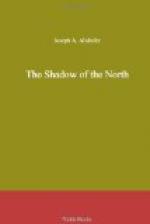“At any rate, Tayoga is a noble type. Since I had to come into the forest I’m glad to meet such fellows as he. Do you think, Lennox, that he’ll get through safely?”
Robert laughed.
“Get through safely?” he repeated. “Why, Tayoga is the fastest runner among the Indian nations, and they train for speed. He goes like the wind, he never tires, night and day are the same to him, he’s so light of foot that he could pass through a band of his own comrades and they would never know he was there, and yet his own ears are so keen that he can hear the leaves falling a hundred yards away. The path from here to the vale of Onondaga may be lined on either side with the French and the hostile tribes, standing as thick as trees in the forest, but he will flit between them as safely and easily as you and I would ride along a highroad into Philadelphia. He will arrive at the vale of Onondaga, unharmed, at the exact minute he intends to arrive, and he will return, reaching Fort Refuge also on the exact day, and at the exact hour and minute he has already selected.”
The young Quaker surveyed Robert with admiration and then laughed.
“What they tell of you is true,” he said. “In truth that was a most gorgeous and rounded speech you made about your friend. I don’t recall finer and more flowing periods! What vividness! What imagery! I’m proud to know you, Lennox!”
Robert reddened and then laughed.
“I do grow enthusiastic when I talk about Tayoga,” he said, “but you’ll see that what I predict will come to pass. He’s probably told Willet just when he’ll be back at Fort Refuge. We’ll ask him.”
The hunter informed them that Tayoga intended to take exactly ten days.
“This is Monday,” he said. “He’ll be here a week from next Thursday at noon.”
“But suppose something happens to detain him,” said Wilton, “suppose the weather is too bad for traveling, or suppose a lot of other things that can happen easily.”
Willet shrugged his shoulders.
“In such a case as this where Tayoga is concerned,” he said, “we don’t suppose anything, we go by certainties. Before he left, Tayoga settled the day and the hour when he would return and it’s not now a problem or a question. He has disposed of the subject.”
“I can’t quite see it that way,” said Wilton tenaciously. “I admit that Tayoga is a wonderful fellow, but he cannot possibly tell the exact hour of his return from such a journey as the one he has undertaken.”
“You wait and see,” said the hunter in the utmost good nature. “You think you know Tayoga, but you don’t yet know him fully.”
“If I were not a Quaker I’d wager a small sum of money that he does not come at the time appointed,” said Wilton.
“Then it’s lucky for your pocket that you’re a Quaker,” laughed Willet.
It turned much colder that very afternoon, and the raw edge of winter showed. The wind from the northwest was bitter and the dead leaves fell in showers. At dusk a chilling rain began, and the young soldiers, shivering, were glad enough to seek the shelter of the blockhouse, where a great fire was blazing on the broad hearth. They had made many rude camp stools and sitting down on one before the blaze Wilton let the pleasant warmth fall upon his face.




